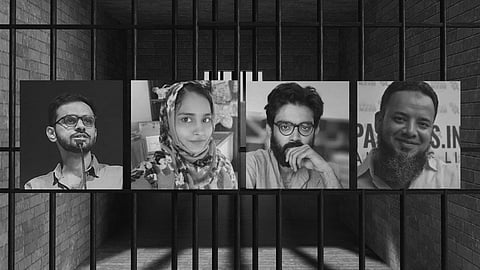

EVERYTHING GOT DONE WITHIN a matter of seconds. To a couple of non-lawyer friends, it seemed appalling, the brevity of it all. But court practitioners know this is how fates get sealed in our courts — matter name/number is called out, judgment is pronounced, the next item gets taken up. Business as usual.
The suddenness of the dismissal in this case however was accentuated by the peculiarity of facts. Those few seconds carried the weight of five plus years. This is a trial which, whenever this nightmare is over, would be taught in law school classrooms as the most enduring evidence of India’s Jim Crow era.
Six of these accused have already undergone more than five years of incarceration without a trial. Arguments on charges are yet to be completed. Even if the trial were to start, around 700 witnesses would have to be examined to complete deposition. These facts alone would merit bail; any conscientious constitutional court would not bother going into the specifics of the case. But this trial is important to India’s ruling dispensation; its players feed directly into the bogey of faux nationalism, the life breath of this government’s existence and continuation. Umar, Sharjeel, Gulfisha and others are, quite rightly put, “prisoners of the Hindutva state”.
The order rejecting bail runs into 133 pages, and is divided into four parts. Umar and Sharjeel have been dealt with together. At the outset, it is telling that the period of incarceration does not seem to perturb the Court even once. For perspective, Sharjeel has been imprisoned for 2044 days now; Umar, for 1815 days. The Delhi High Court simply takes the prosecution’s word at face value and accepts its frivolous plea that Sharjeel and Umar were ‘the intellectual architects behind the entire conspiracy’, ‘having delivered inflammatory speeches on communal lines to instigate a mass mobilisation of members of the Muslim Community’.
Grounds for this conclusion are: (a) creation and exchange of messages in WhatsApp groups; (b) speeches calling for bandhs, chakka jam and non-cooperation; and (c) distribution of pamphlets. We can keep wondering if in a country, which achieved independence based on the ideals of non-cooperation and civil disobedience, ‘mass mobilisation’ should invite terrorism charges. That’s a conversation this Court is unwilling to have because it does not seem to have the gumption. It is executive-trusting and perhaps, it considers the life and liberty of a handful of youngsters a valid trade-off in the great game of nation-building. It is a Court in the service of the State, beholden to political expediency and not to any constitutional principle.
Gulfisha’s facts have been discussed separately. The WhatsApp group she had created was called ‘Auraton ka Inqalab’, which was used to disseminate information regarding ‘protests and for mobilising the women to join at various protests sites’. This mobilisation of women once again comes off as suspicious to the Court. What is most intriguing is the purported reason for denying Gulfisha parity with Devangana Kalita and Natasha Narwal, other members of Pinjra Tod who are now out on bail: the WhatsApp groups that Gulfisha ‘allegedly created, of which one noticeably, revolve around coordination in protests and ensuring that as many women participate in the protests.’ If this were not a tragedy of epic proportions, these observations would evoke contemptuous laughter.
This verdict also confirms that the story of the Unlawful Activities (Prevention) Act in India continues to be one of non-uniform application, its content always dictated by a vindictive State ready to employ it selectively. It is appalling that constitutional courts are consistently willing to buy into the prejudicial character of this law, and rely on its invariable indeterminacy to keep citizens in jail for years on the trot.
After today’s verdict, can any individual say that they enjoy equal protection of law in India, or that we have an impartial rule of law fiercely upheld and guarded by constitutional courts? The Delhi High Court has once again confirmed that we continue to enjoy liberty at the mercy of the State. Legitimacy of all protests, all activism faces the test of the Executive, and not of the Constitution.
Every time I go through Umar’s speeches, or Gulfisha’s poems, I see that it could have been any of us; it could have been any of my public-spirited friends who believe in equality, socialism, secularism and community mobilisation. Yet, it is Umar and Gulfisha and a handful of others who continue to languish behind bars during the prime of their lives. It’s an unspeakable cruelty being inflicted upon them, with the blessings and complicity of our institutions.
If lawyers like us cannot secure bail for Umar and others, perhaps the State can also put us in jail alongside him. It’s because we believe in everything Umar believes in, we support everything he supports. Not only would it be the highest form of solidarity and resistance, but also an honour to share jail time with his cohort. They shine as a lodestar in this age of surrender and capitulation.
Note: This article was first published here on Substack on September 2, 2025.